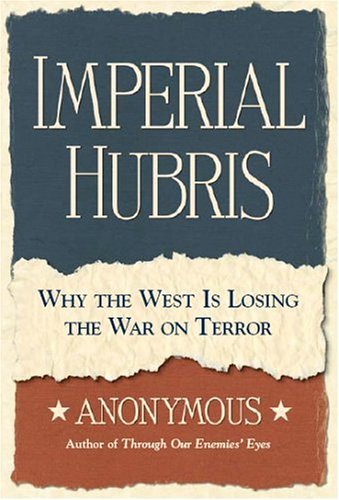 |
David
Fromkin. A Peace to End All Peace: The Fall of the Ottoman Empire
and the Creation of the Modern Middle East
Avon
Books, 1990
ISBN: 0380713004
A
great history of British foreign policy in the context of WWI, the
“great game” and the division of the Ottoman Empire. It
shows the origins of the Middle Eastern nation states and contains
lots of lessons and analogies for US foreign policy in the contemporary
Middle East. (560 pages)
|
|
Zbigniew
Brzezinski. The Grand Chessboard: American Primacy and its Geostrategic
Imperatives
Basic
Books, 1998
ISBN: 0465027261
Published
in the pre-911 world, Brzezinski argues that the US should take advantage
of its superpower status to reorganize global governance in the next
20 years. This book illustrates a multilateral, diplomatic approach
to global governance. (210 pages).
|
 |
Chalmers
Johnson. The Sorrows of Empire: Militarism, Secrecy and the End
of the Republic
Henry
Holt, 2004
ISBN: 0805077979
Chalmers
Johnson, the author of Blowback: The Costs and Consequences of American
Empire. He argues that, unintentional as it may have been, the US
is now dominated by militarism, an empire of bases with its own logic,
institutions and command structure ready not to fight wars, but police
an empire. He critiques the “globalization” of the 90s
and identifies its replacement as unilateral military policy. (2004
310 pages).
|
 |
David
Frum and Richard Perle. An End to Evil: How to Win the War on
Terror
Random
House, 2003
ISBN: 0345477170
Both
of the authors are key advisors to the Bush Administration and write
in a post 911 context. They identify key targets for both The War
at Home and The War Abroad (260 pages).
|
 |
Sayyid
Qutb.
Social Justice in Islam
Islamic
Publications International (revized edition), 2000
ISBN: 188999113
As
many see Leo Strauss’ philosophy behind US neo-conservatives,
so the ideas of Sayyid Qutb are seen as the foundation of contemporary,
militant Islam. Qutb published this work in 1949 and was subsequently
hanged in 1966 for his alliance with the Muslim Brotherhood and for
his opposition to the western oriented regime of Egyptian leader,
Gamal Abdel Nasser. (1949, 318 pages)
|
 |
Anonymous.
Imperial Hubris: Why the West Is Losing the War on Terror
R.R.
Bowker LLC, 2004
ISBN: 1574888498
Written
by a CIA desk officer with two decades of experience in national security
issues related to Afghanistan and South Asia, this author critiques
the notion of basing foreign policy on the 8notion of “terror”
and calls for analysis based on the dynamics of specific US policies
in the Middle East. (262 pages)
|
 |
Anne
Norton, Leo Strauss and the Politics of American Empire
Yale
University Press, 2004
ISBN:
0300104367
Professor Norton traces the philosophical underpinnings
of neo-conservative policy makers such as Paul Wolfowitz, Leon
Krass, Carnes Lord, Irving Kristol and other “Straussians” who
help shape the Bush administration’s foreign policy. (228
pages). |






